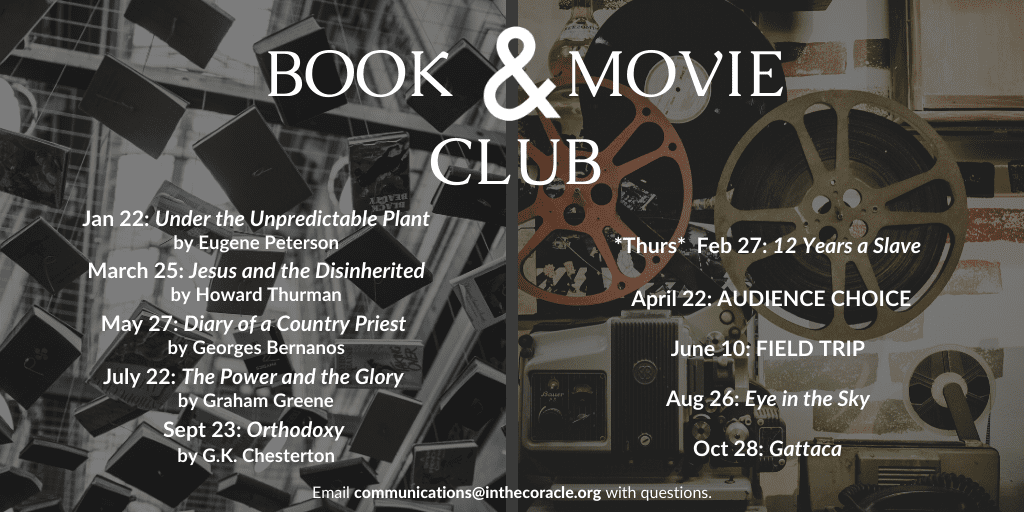At Coracle, we aim “to inspire and enable people to be the presence of God in the brokenness of the world through Spiritual Formation for Kingdom Action.” With that mission clearly stated, it is fair to wonder why we would choose to gather once a month to discuss a book or film together. What do movies have to do with Spiritual Formation or Kingdom Action after all?
Having both worked on films and studied fictional storytelling through a theological lens, my (admittedly biased) answer is that the stories we read and watch can have quite a bit to do with our spiritual lives and our lives in the world. If you already agree with this conclusion, I hope you will consider joining us at an upcoming Screening & Discussion or at a monthly Book & Movie Club! But if you’re still on the fence, allow me to suggest three reasons why Christians ought to take stories seriously.
1) Stories “Incarnate” Universal Human Questions
Stories worth reading or watching do more than merely entertain. The best stories have “stakes” that feel compelling because they are universal. They pose what John May describes as the “perennial religious questions [about] man’s relation to the universe (the God question), to other men (the problem of evil), and to himself (the nature of salvation).” Who am I? Why am I here? How do I live well?

©2012 Disney/Pixar.
Think of Marlin learning how to become a father who doesn’t stifle Nemo with his love; think of Woody as he wrestles with living-out his created purpose amidst changing circumstances; think of a non-Pixar example if you like! The important thing to recognize is that, unlike a rational treatise, the questions are embedded in the structure of the narrative, and their answers are worked out over the course of the plot. The whole narrative arc functions to embody or “incarnate” a particular question or set of questions, which are often called the “philosophical stakes” of the story.
Knowing this fundamental dynamic of storytelling enables us to read and watch more attentively; we can parse and discern the particular worldview of a given story-world based on how it resolves its philosophical stakes. Occasionally, these narrative “answers” are consonant with a biblical worldview, but far more often they are not. When we encounter stories of this second kind, rather than rejecting the story wholesale, we can take careful note of the universal human questions driving the story’s philosophical stakes. These grant us a keen look into the dominant longings and anxieties of the world we live in and, hopefully, help us feel compassion for that world.
2) Stories are “Empathy Machines”
Roger Ebert once called movies “the most powerful empathy machines in all the arts.” While the multi-sensory experience of a film certainly possesses a unique potency for stirring up deep feelings in a viewer, I would argue that Ebert’s comment applies just as well to all story-carrying media. Stories grant us special access into lives and perspectives we might not otherwise inhabit. They give us the opportunity to see ourselves in an entirely different context, and they force us to wonder how we might respond to those very different circumstances. In a real sense, we are given the opportunity to live vicariously through the story characters we encounter. Even brain science has testified to the power of stories over simple facts and figures to generate empathy and change behavior.
We are members of a community of faith called to embody the compassion of Jesus (Matt 9:36, 14:14, 15:32, 20:34; Mark 1:41, 6:34, 8:2; Lk 7:13). So it stands to reason that we ought to be seeking out ways to cultivate compassion in our lives as stepping stones to meaningful service in the world. Because of course, Jesus didn’t just feel empathy, he also acted out of his empathy for the good of the people he encountered. Good stories are one way we can experience the humanity of individuals, groups, and cultures with whom we don’t commonly interact. This foundation of empathy can and should enable us, insofar as we are willing to follow Christ’s example, to take practical steps towards becoming God’s loving, healing, and reconciling presence to those around us.
3) God Loves Stories
How often do we stop to reflect on the fact that most of the Bible – the primary means by which Christians can come to know their God – takes the form of a narrative? Narrative is such a massive presence in our Scripture that many theologians recognize one unified Story spanning the whole Bible consisting of four to seven “acts” (depending on who you ask) running from Creation (Gen 1-2) to Consummation (Rev 21-22). In other words, God gave us a Story by which to understand our lives.
The climax of this story centers around Jesus, God-made-flesh, whose time on this earth is handed down to us through four distinct narratives, each with their own storytelling styles and emphases. To take it even further, within three of these narratives (Matthew, Mark, and Luke), the character of Jesus is one who spends a lot of time inventing and telling a particular kind of fictional story (parables) in order to promote the spiritual transformation of his audience.
At each of these points, it is not difficult for us to imagine that things could have been different: our scripture could be a compendium of descriptors about the God we worship or commands about how we ought to live; the life of Jesus could have been distilled and passed down as merely a collection of moral, ethical, or philosophical teachings. But instead we have a Story, made up of a collection of stories, all ultimately focused around a God who, when He became a human, was Himself a masterful storyteller.
Immersing ourselves again and again in this Story and its stories can help us more wisely consume and contextualize the stories created by the world in which we live. We have already seen that thoughtful engagement with the stories of our day can help us understand and empathize with our global neighbors, but might it even be the case that this thoughtful engagement could sharpen our ability to enter into the stories of our Bible and marvel at their main Character?
Please join us on the 4th Wednesdays of the month in Arlington, VA for our Book & Movie Club! Here is what we will be watching and reading together in 2020:

